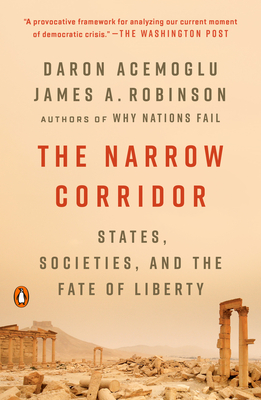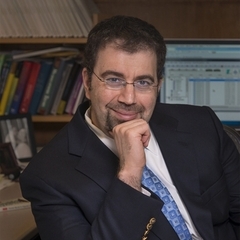

 Penguin Books
Penguin Books
The Narrow Corridor: States, Societies, and the Fate of Liberty


Key Metrics
- Daron Acemoglu
- Penguin Books
- Paperback
- 9780735224407
- 8.3 X 5.4 X 1.3 inches
- 1.05 pounds
- Political Science > Comparative Politics
- English
 Secure Transaction
Secure TransactionBook Description
In Why Nations Fail, Daron Acemoglu and James A. Robinson argued that countries rise and fall based not on culture, geography, or chance, but on the power of their institutions. In their new book, they build a new theory about liberty and how to achieve it, drawing a wealth of evidence from both current affairs and disparate threads of world history.
Liberty is hardly the natural order of things. In most places and at most times, the strong have dominated the weak and human freedom has been quashed by force or by customs and norms. Either states have been too weak to protect individuals from these threats, or states have been too strong for people to protect themselves from despotism. Liberty emerges only when a delicate and precarious balance is struck between state and society.
There is a Western myth that political liberty is a durable construct, arrived at by a process of enlightenment. This static view is a fantasy, the authors argue. In reality, the corridor to liberty is narrow and stays open only via a fundamental and incessant struggle between state and society: The authors look to the American Civil Rights Movement, Europe's early and recent history, the Zapotec civilization circa 500 BCE, and Lagos's efforts to uproot corruption and institute government accountability to illustrate what it takes to get and stay in the corridor. But they also examine Chinese imperial history, colonialism in the Pacific, India's caste system, Saudi Arabia's suffocating cage of norms, and the Paper Leviathan of many Latin American and African nations to show how countries can drift away from it, and explain the feedback loops that make liberty harder to achieve.
Today we are in the midst of a time of wrenching destabilization. We need liberty more than ever, and yet the corridor to liberty is becoming narrower and more treacherous. The danger on the horizon is not just the loss of our political freedom, however grim that is in itself; it is also the disintegration of the prosperity and safety that critically depend on liberty. The opposite of the corridor of liberty is the road to ruin.
Author Bio
Professor Daron Acemoglu teaches at the Department of Economics, MIT and his fields of interest include Political Economy, Economic Development, Economic Growth, Economic Theory, Technology, Income and Wage Inequality, Human Capital and Training, Labor Economics, and Network Economics.
Education
- London School of Economics Ph.D. Nov., 1992
- London School of Economics MSc. June, 1990
- University of York B.A. June, 1989
Title Of Doctoral Thesis
- Essays in Microfoundations of Macroeconomics: Contracts and Economic Performance
Professional Experience Academic Positions
- 1992-1993 Lecturer in Economics, London School of Economics
- 1993-1997 Assistant Professor of Economics, M.I.T.
- 1997-2000 Pentti Kouri Associate Professor of Economics, M.I.T.
- 2000-2004 Professor of Economics, M.I.T.
- 2004-2010 Charles P. Kindleberger Professor of Applied Economics, M.I.T.
- 2010-2019 Elizabeth and James Killian Professor of Economics, M.I.T. 2019-present MIT Institute Professor
Videos
No Videos
Community reviews
Write a ReviewNo Community reviews